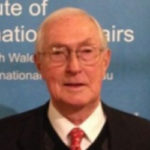Trump’s decision to order the assassination of Iranian General Soleimani is understandably dominating coverage and analysis of world affairs, completely overshadowing consideration of Kim Jong Un’s end of year statement, even though it had been somewhat anxiously awaited.
But the North Korean statement may also shed light on the US’s current foreign policy stance, under Trump and Pompeo. With the impeachment trial and this year’s election in mind, have Trump and his Administration decided to make toughness their watchword?
The long concluding statement released at the end of the recent North Korean Workers’ Party meeting is being analysed largely in terms of the indications it contains of North Korea’s intended future policies. Phrases such as “new strategic weapon” and “shift to a shocking actual action” are being examined, as are references to further steps “depending on the US’s future attitude”. Observers note that Kim did not explicitly say that he was formally lifting the test moratorium.
Taken as a whole the statement clearly shows North Korea’s disenchantment with the results so far of its “engagement” with the US. It seems to indicate that the US is sticking to its initial position—formulated by the former National Security Adviser John Bolton—that the resolution of the North Korean nuclear and missile challenge had to be the “Libyan” solution: before the US would lift or allow the UN to lift its economic sanctions, North Korea would have to get rid of its entire nuclear arsenal and capacity.
From the beginning this seemed a non-starter: the North Koreans’ nuclear and missile capacity was developed as a deterrent against attack by the US; how could they be expected to totally abandon it, before receiving any benefit and at a time when the US, the country they fear, is in effect waging economic warfare against them? The Chinese proposal, for step by step mutual reductions in, on the one hand, nuclear capacity, and on the other in economic sanctions, always seemed more realistic and more likely to succeed.
And indeed before last year’s Trump-Kim summit in Hanoi there were various indications—including from the US’s chief negotiator with North Korea, Steve Biegun—that a deal of that kind had been reached between the two sides, and that the two leaders would formally endorse it in Hanoi. But as we know that didn’t happen, and Trump left early. Some observers blamed the malign influence of Bolton, a late inclusion in Trump’s team at the summit, for this. Observers also noted that the deal as reported, involving the closing down of Yongbyong, North Korea’s main nuclear facility, represented “non-trivial” concessions on North Korea’s part, and should not have been sneezed at.
With factors like these in mind observers hopeful of seeing some progress on the Peninsula took heart at the absence of Bolton from Trump’s entourage when he met Kim at Panmunjom later last year. Biegun has since become even more the most publicly prominent US official in regard to North Korea, but despite that it seems no progress has been made. At the same time Russia has joined China in calling for a relaxation of US/UN sanctions and a balanced, step by step solution—-a position endorsed by many commentators, including some in the US.
So what is one to make of all this? It seems that the US is sticking to its initial “all or nothing, and in advance”position, despite the fact that it has been obvious from the start that North Korea won’t accept it. Is Trump doing this because of a belief that economic sanctions will work over time, however leaky they may seem? (He is certainly very ready to use them, having just threatened Iraq with them, as well as having imposed them on Iran.) Is he simply so anxious, perhaps particularly in the light of his domestic political situation, to portray himself as a “tough” national leader that he is prepared to give up the prospect of being the one to achieve a diplomatic break-through with North Korea. Maybe: certainly toughness seems to be “in”, given his latest threat to respond to any Iranian retaliation with “disproportionate” attacks, including on Iranian cultural targets. Whatever the rationale, it seems that no progress between the US and North Korea is likely at present.
Geoff Miller is a former Australian diplomat and government official and former Australian Ambassador to South Korea.




